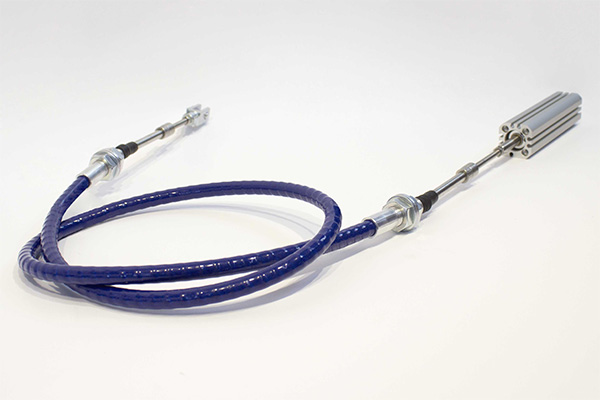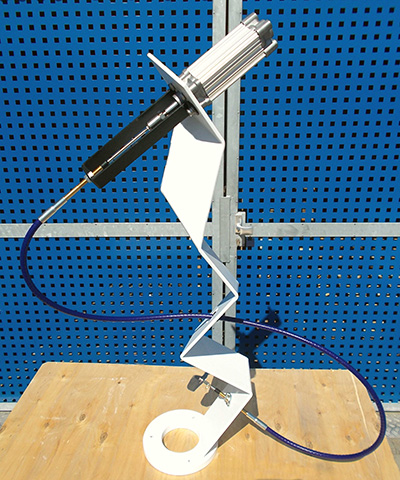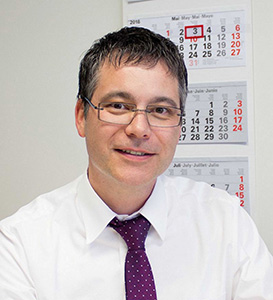2018-12-12
The extended arm of the cylinder
Push/pull cables from RINGSPANN RCS convince as a stroke extension for linear drives
Everywhere in mechanical engineering and plant construction, pneumatic, hydraulic and electrical cylinders enable the automation of linear kinematics. However, it is not always possible to position the linear drive right at the heart of the action. Confined installation spaces, dirty surroundings and high temperatures can present an obstacle to this, just like risks of explosion and radiation exposure. In such cases, clever engineers turn to RINGSPANN RCS’ mechanical push/pull cables. And that is because the flexibly layable remote control systems allow lifting forces of linear drives to be safely transferred across many metres. Read here about which projects the power cable specialists from Oberursel are currently working on.
Whether it’s about the use of lean pneumatic and electrical cylinders in automation technology, or the use of strong hydraulic cylinders in machines in the construction industry or the coal and steel industry: Engineers everywhere find themselves confronted with the problem that power-inducing linear cylinders cannot be positioned right at the heart of the kinematic action. And there are plenty of reasons for this. Usually it is a lack of installation space and particularly demanding operating conditions (e.g. dust, heat, radioactivity) that force the spatial separation of drive and actuator. To get the necessary forces safely to their moving destination despite this, just ask the remote control system specialists at RINGSPANN RCS in Oberursel near Frankfurt am Main. They have worked on various different projects on specific system solutions where lifting forces – generated through pneumatic, electrical or hydraulic cylinders – are transferred mechanically via flexibly laid push/pull cables. “The groundwork to ensure that this can be carried out permanently free of disturbing influences and with a high degree of reliability is provided by decades of acquired expertise in kinematics and tribology, along with the daily practical work with the push/pull cables from our broadly diversified overall range”, says Christian Kny, managing director of RINGSPANN RCS.
Refuse collection vehicles, concrete saws and robots
RINGSPANN RCS’ projects, usually initiated by customers, address issues like how hydraulic cylinders of lifting and tilting devices of refuse collection vehicles can be kept out of the dirty area, or how concrete saws can operate efficiently without needing to upgrade their hydraulic linear drives to situate them in the dusty sawing zone. Christian Kny also makes reference to a highly ambitious innovation project: “For applications in industrial automation, we are currently focusing on how we can relieve the burden on the built-in drive modules of modern articulated and portal robots and instead control their kinematics from remotely positioned adjust cylinders via mechanical push/pull lines. The robot could then be greatly simplified from a constructional point of view, could be designed much lighter, and in fact would in fact act more quickly at the end of the day.” Elsewhere, the specialists of RINGSPANN RCS are working on realising synchronised multi-cable systems that can transfer particularly large forces of hydraulic cylinders.
A million cycles and more
These kinds of engineering projects can only be carried out because RINGSPANN RCS’ mechanical cable systems are high-grade manufactured, quality products. They are designed for more than 1.0 million cycles and convince thanks to excellent sliding properties. Furthermore, they are intrinsically safe, maintenance free, extremely flexible and protected against splash water. In general, they prove to be an ideal solution for all applications where forces need to act between spatially separated, fixed components, but where it must be possible to separate the connection of input and output force through a flexible system.
Depending on the model and depending on the stroke, bi-directional push/pull cables from RINGSPANN RCS can be used to transfer pushing forces of up to 3,150 N and pulling forces of up to 4,500 N. In practice, these standard values cover a broad range of applications. In project work, however, they often only serve as a rough orientation. “When developing and engineering customer-oriented system solutions, other design parameters often have a greater relevance – for example the continuous operation safety and functional safety, possible laying radii, response behaviour, or the suitable design of the end parts”, stresses Christian Kny.
By the way: If there’s no time to conduct a comprehensive development project, from certain batch sizes RINGSPANN RCS also offers the option of coordinating and configuring common standard types of its push/pull cables from the standard range to customer specifications.
Top quality in series
The push/pull cables from the premium 380 series rank among RINGSPANN RCS’s premium products. As bi-directionally operating Bowden cables, they are suitable for the transfer of high loads, for laying with minimal bending radii and for use under constant temperatures from -50° C to 100° C. These cable systems are only equipped with spiral-shaped flat wire reinforcement, but also with Teflon-coated cores and a finely tuned inner pipe in the conduit. The heavy-load cables from the 280 series for pushing forces of up to 3,150 N and pulling forces of up to 4,500 N also have this feature. It minimises sliding friction and makes it possible to achieve very small bending radii. The standard cables from the 280 series, many of which are also available through a 24/7 rapid delivery service, are suitable for pushing forces of up to 320 N and pulling forces of up to 540 N. They, too, already feature flat-wire reinforced and Teflon-coated cores, connection parts made of stainless steel, and seals against dust and moisture.













